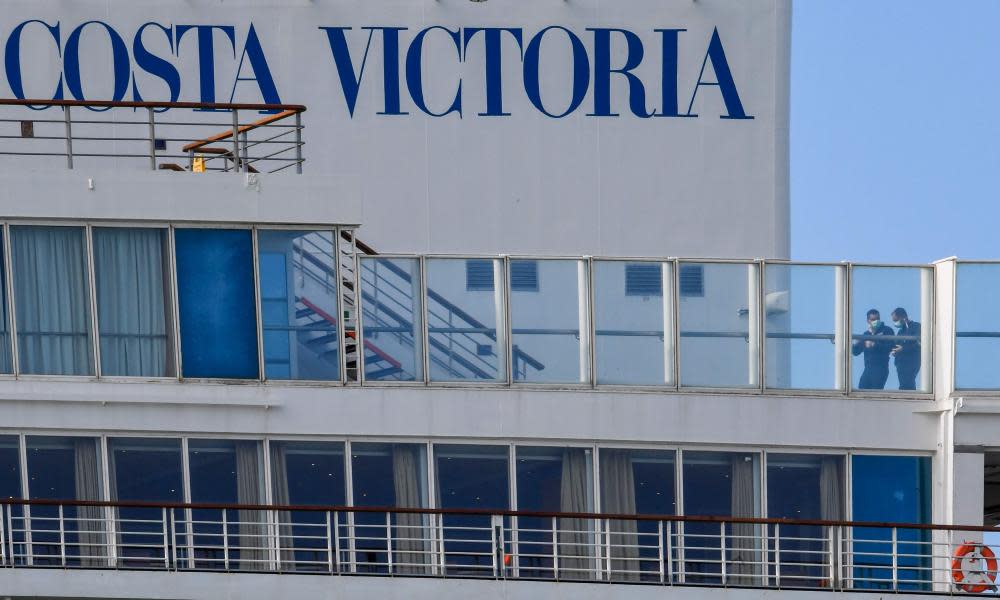The choice for 300 Australians: stay on cruise ship with Covid-19 positive passenger or disembark in Italy

More than 300 Australians on the Costa Victoria cruise ship face a choice between staying on board the potentially Covid-19-stricken vessel, or disembarking in Italy, now the global centre of the virus outbreak.
International flights are being cancelled by airlines across the globe – Qantas is set to stop all international flights by the end of the month – meaning those who disembark in Italy could be stranded there for weeks if repatriation flights can’t be organised.
Many of the Australians on board the Costa Victoria are elderly, and some have underlying health issues, putting them in the highest risk category for a severe infection.
At least one passenger on the ship tested positive while on board. The man disembarked in Crete.
Related: Cruise ship passengers to be quarantined on Rottnest Island in Western Australia
The Italian-flagged Costa Victoria, at sea for a fortnight, docked in Civitavecchia, a port town on the Tyrrhenian Sea 60 kilometres north-west of Rome on Wednesday (Italian time).
Australians Brenda and Dave Rondo say while the ship has docked, they have still not been allowed off.
“We have to stay in the cabin, they knock on the door and leave food and they step back. The staff has gone from lovely to now, if you ask nicely for milk for your coffee in the morning, they yell at you and say ‘no!’
“We have heard different things, but not from the Captain, that we may go to Rottnest Island in Western Australia for quarantine, but ... the last we heard we will have to stay in Rome in a motel for two weeks.”
Costa Victoria passengers may be mandated to follow a similar isolation course to passengers from the Costa Luminosa which docked in Savona in northern Italy earlier this week. The ship also had confirmed Covid-19 cases on board.
Passengers from neighbouring European countries were allowed to travel home to isolate, but Australians, South Africans and others from more distant nations were forced to remain in Italy to isolate for a fortnight.
Confirmed cases of Covid-19 were left on the ship in Savona, while other passengers were put on buses and driven to Rome, more than 560km away.
However, some passengers say the hotel rooms, which they will be unable to leave for two weeks, are worse than the ship.
“It’s smaller than our cabins, no hanging space and barely room to walk around,” said Ivan Maronian.
Others have complained of no pillows, taps not working and only tiny meals being provided. Many have been unable to wash any clothes since the ship entered lockdown weeks ago.
Even worse is the fear of what might happen if they get sick.
“It’s completely terrifying because if he got coronavirus on there I’m really not sure what kind of medical care he would be getting, given the situation,” said Laura Bendlin, whose father was on board.
“Worst-case scenario, he dies.”
Italy has now surpassed China for total Covid-19 deaths: nearly 75,000 cases have been confirmed, and more than 7,500 people have died.
But cruise ships have posed acute problems for health authorities around the world. The inescapably confined nature of the vessels has seen them become rapid incubators of Covid-19.
For several days in February, the ill-fated Diamond Princess which was put into isolation in Yokohama Port, Japan, after isolated cases were detected on board, was the second-largest outbreak site for coronavirus in the world, behind mainland China.
During a two-week enforced quarantine on board, nearly 700 people were infected, and seven died. The quarantine was abandoned and crew and passengers ultimately disembarked (most were placed into a further fortnight’s quarantine in their home countries).
Currently, on board the Zaandam – carrying about 100 Australians and stranded off the west coast of South America – at least 80, and reportedly up to 140, passengers and crew are sick with flu-like symptoms. A quarter of the crew is reportedly quarantined and passengers are said to be “terrified and stressed”.
The ship is being replenished by another ship, Rotterdam, which will bring extra supplies, staff and Covid-19 test kits aboard (there are none at present). The ship intends to sail to Fort Lauderdale, Florida, to disembark by the end of the month.
Even ships without any Covid-19 cases are being treated with extreme caution by ports around the world.
The Norwegian Jewel was turned away from four countries – including Australia – before being allowed to dock and passengers disembark in Hawaii, despite being at sea for weeks and having no suspected or confirmed cases.
Stung by the excoriating public reaction to infected Ruby Princess passengers being allowed to disembark unchecked in Sydney - Australian governments have tightened all movements for cruise ship passengers.
NSW has said no ships will disembark in the state until new protocols are established, while the federal government has taken nearly 300 Australian passengers from the Norwegian Jewel flown back into Sydney from Hawaii overnight, into quarantine in a Sydney motel, guarded by police.
Around the world, 3,000 Australians are stranded on more than 20 cruise ships because countries have shut their borders because of coronavirus.
The Australian government says it is aware of the dire situation faced by many of those onboard: the lack of ports for ships to dock and the rapidly shrinking avenues for repatriation once ashore.
A Dfat spokesman said the department had raised concerns with Italian authorities about cruise ships disembarking passengers in areas already hard-hit by Covid-19, urging authorities to find safer alternative ports.
The foreign minister Marise Payne said her department was working “around the clock” to help Australians home. She said the government was speaking with Qantas and Virgin about launching repatriation missions for stranded Australians, but has conceded it will be impossible to reach all Australians who wish to come home.


